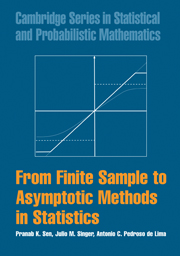Book contents
- Frontmatter
- Contents
- Preface
- 1 Motivation and Basic Tools
- 2 Estimation Theory
- 3 Hypothesis Testing
- 4 Elements of Statistical Decision Theory
- 5 Stochastic Processes: An Overview
- 6 Stochastic Convergence and Probability Inequalities
- 7 Asymptotic Distributions
- 8 Asymptotic Behavior of Estimators and Tests
- 9 Categorical Data Models
- 10 Regression Models
- 11 Weak Convergence and Gaussian Processes
- Bibliography
- Index
Preface
Published online by Cambridge University Press: 05 June 2012
- Frontmatter
- Contents
- Preface
- 1 Motivation and Basic Tools
- 2 Estimation Theory
- 3 Hypothesis Testing
- 4 Elements of Statistical Decision Theory
- 5 Stochastic Processes: An Overview
- 6 Stochastic Convergence and Probability Inequalities
- 7 Asymptotic Distributions
- 8 Asymptotic Behavior of Estimators and Tests
- 9 Categorical Data Models
- 10 Regression Models
- 11 Weak Convergence and Gaussian Processes
- Bibliography
- Index
Summary
Students and investigators working in statistics, biostatistics, or applied statistics, in general, are constantly exposed to problems that involve large quantities of data. This is even more evident today, when massive datasets with an impressive amount of details are produced in novel fields such as genomics or bioinformatics at large. Because, in such a context, exact statistical inference may be computationally out of reach and in many cases not even mathematically tractable, they have to rely on approximate results. Traditionally, the justification for these approximations was based on the convergence of the first four moments of the distributions of the statistics under investigation to those of some normal distribution. Today we know that such an approach is not always theoretically adequate and that a somewhat more sophisticated set of techniques based on asymptotic considerations may provide the appropriate justification. This need for more profound mathematical theory in statistical large-sample theory is patent in areas involving dependent sequences of observations, such as longitudinal and survival data or life tables, in which the use of martingale or related structures has distinct advantages.
Unfortunately, most of the technical background for understanding such methods is dealt with in specific articles or textbooks written for a readership with such a high level of mathematical knowledge that they exclude a great portion of the potential users. We tried to bridge this gap in a previous text (Sen and Singer [1993]: Large Sample Methods in Statistics: An Introduction with Applications), on which our new enterprise is based.
- Type
- Chapter
- Information
- From Finite Sample to Asymptotic Methods in Statistics , pp. xi - xiiPublisher: Cambridge University PressPrint publication year: 2009

